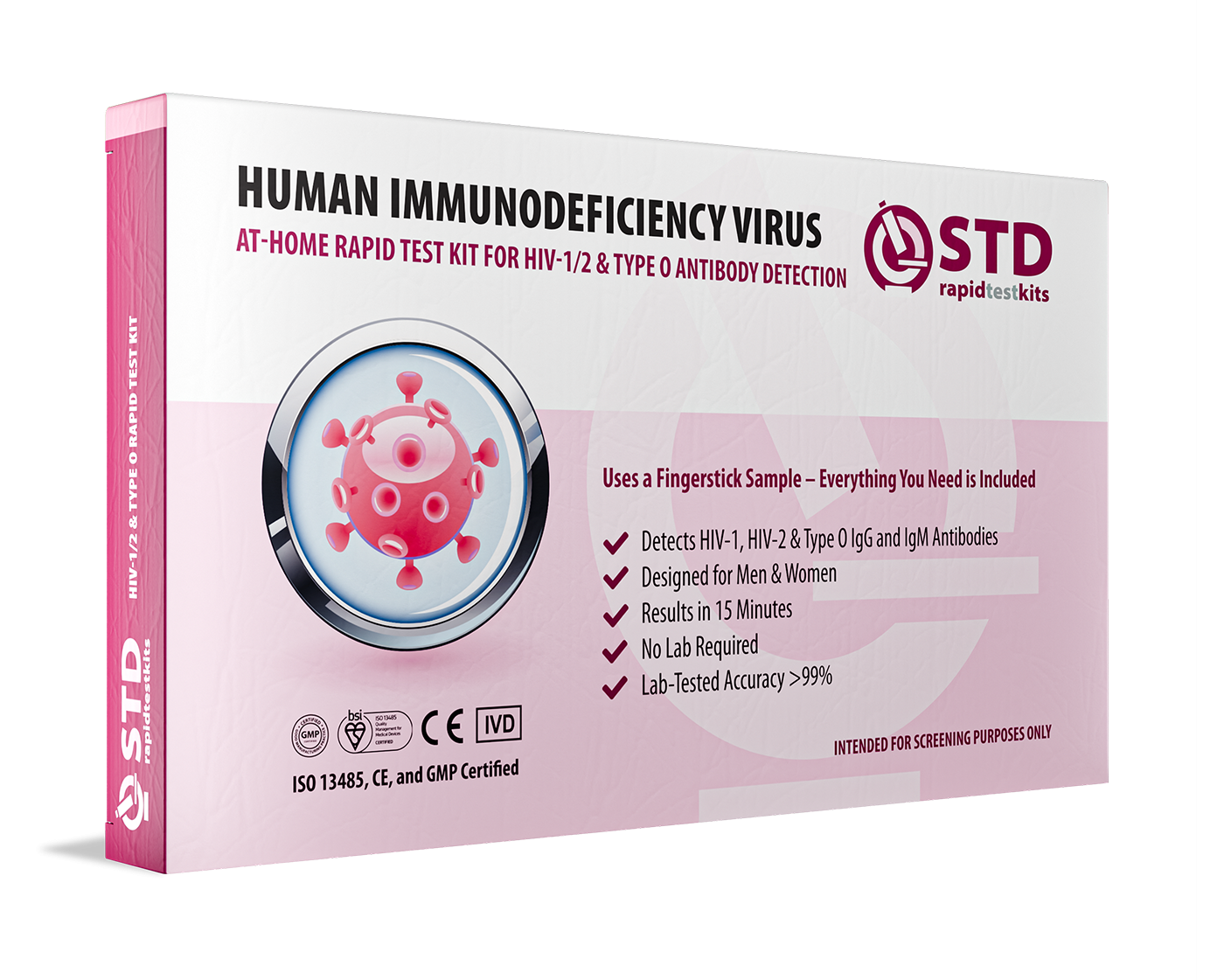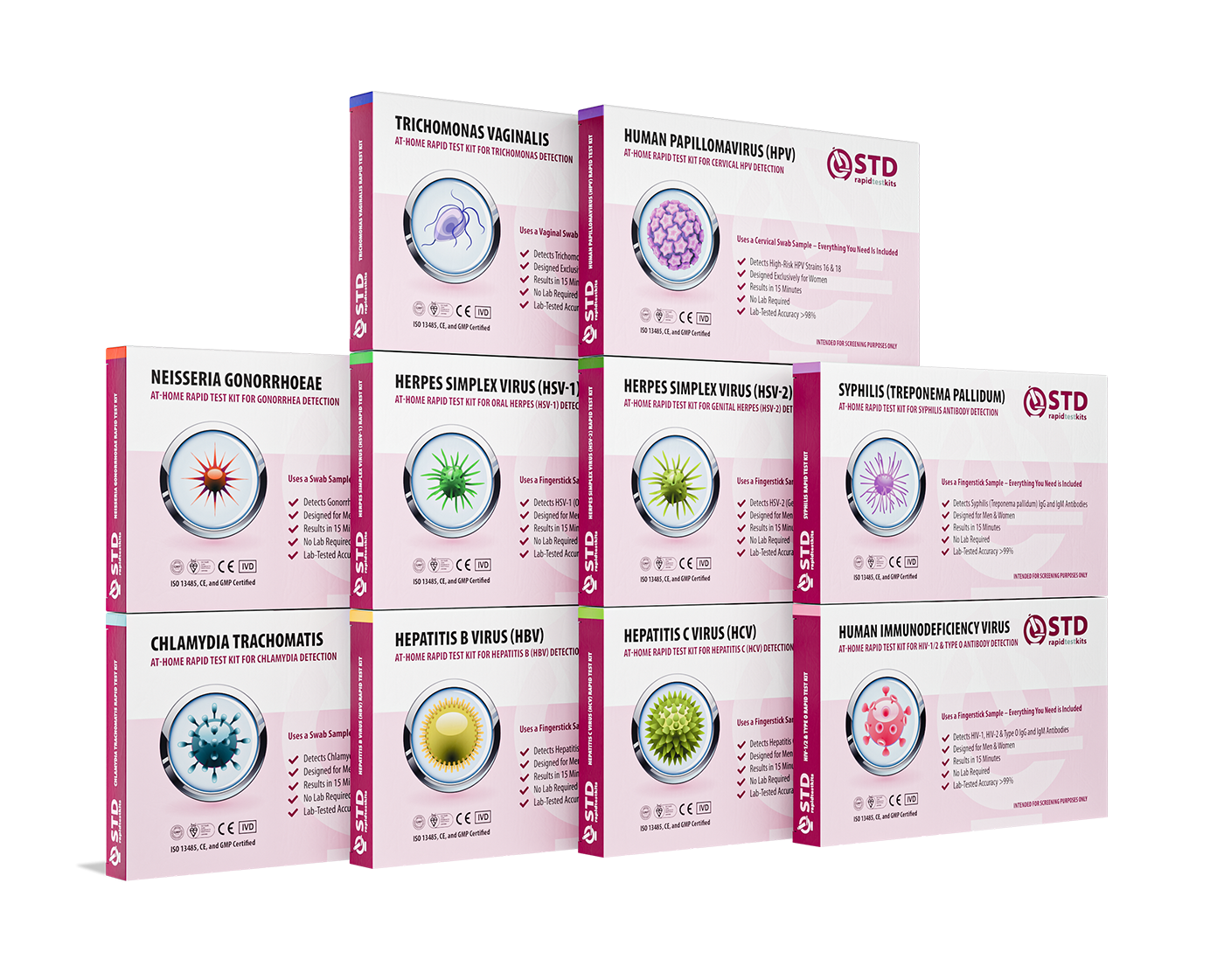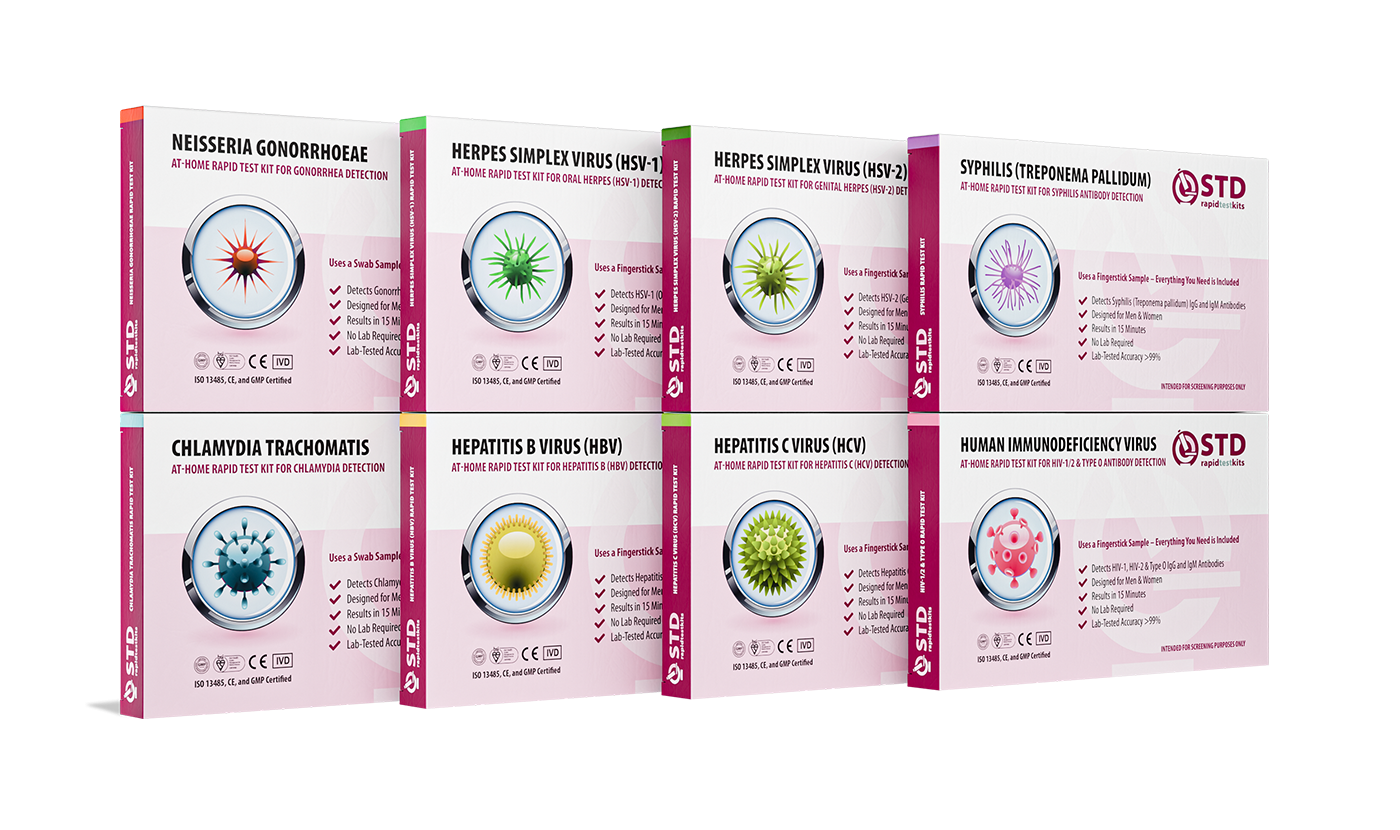Oral, Vaginal, or Anal: Which Sex Act Has the Highest STD Risk?
The Hidden STD Risks of Anal Sex
When it comes to sexual health, a lot of the focus appears to be put on vaginal or oral sex. But the fact is that anal sex receives as much attention, if not more, when it comes to the risk of STDs.
The CDC reports that the tissue covering the rectum is much thinner and weaker than the tissue covering the vagina, so it is much more susceptible to microscopic tears during sex. Micro-tears can act as a doorway for viruses and bacteria, significantly increasing the potential for transmission. And that risk is two-way, whether you're the receiving or penetrating partner, there's risk of exposure if protection isn't being used.
Here's what research indicates:
- Receptive anal intercourse (being the "bottom") is the most risky for HIV transmission, with estimates placing it at 18 times more dangerous than vaginal sex.
- Even if condoms are employed, if they burst or slip, more likely during anal intercourse, the protection is severely reduced.
- STDs such as gonorrhea, chlamydia, and syphilis can infect the rectum without resulting in noticeable symptoms, which means one could inadvertently transmit them.
That single giant issue? Most aren't aware of this. From Planned Parenthood's perspective, however, a large number of patients never bring up anal sex during exams because they are ashamed or ask themselves whether it matters. That quiet can lead to unexplained infections and the heightened risk of inadvertently transmitting them.
It's not that you're stupid, it's that you're underserved by sex education. Anal sex hardly gets discussed in health class in school, and when it does get discussed, it gets waved off as "high-risk" without any real teaching on how to make it safer.
But that's why we're here, to get real with you and fill in the gaps.

Why Safe Anal Sex Matters – Benefits Beyond the Bedroom
Okay, let’s take a step back. We’ve talked about the risks, but here’s the flip side: when practiced safely, anal sex can be a fulfilling and consensual part of a healthy sex life. It’s not about shaming the act itself; it’s about making informed decisions. And the benefits? They’re more than just physical.
Intimacy and Trust
For many couples, anal sex is a sign of trust. Because it requires open communication, preparation, and agreement, it can also lead to heightened emotional intimacy and sexual empowerment. When both lovers are in agreement, it is a safe space for vulnerability and discovery.
Pleasure, When Done Right
Unlike ancient myth, anal sex can be had by all sexes. For prostate owners, rectum stimulation can bring strong orgasms. For others, pressure and nerve endings in the area can bring a whole other kind of pleasure. But there's the rub, relaxation and permission have to come first, with the right lubrication and conversation.
Sexual Variety and Exploration
Human beings are naturally inquisitive. Anal sex can give couples an option to explore new sex dynamics in the bedroom. So long as mutual respect and firmly defined boundaries prevail, it might diversify the bedroom, and help couples learn even more about desires and bodies.
Better Conversations Around Protection
Believe it or not, introducing anal sex into your relationship can lead to necessary discussions about STDs, testing, and protection. It prompts conversations that would otherwise be avoided if partners take for granted vaginal sex as the sole risk factor. And that knowledge?
It works in your favor when it comes to your overall sexual well-being.
Empowerment Through Education
Understanding how to reduce risks, through condom use, water-based lubricants, and testing, can empower people about their own health. And empowerment is sexy. When people feel safe in the choices they're making, they're going to be more likely to speak up for their own health and their partner's as well.
So yes, anal sex does have its advantages, but only if you go in with knowledge and awareness. Pleasure and safety always need to go hand-in-hand.
Check Your STD Status in Minutes
Test at Home with RemediumHIV Rapid Test Kit

 For Men & Women
For Men & Women Results in Minutes
Results in Minutes No Lab Needed
No Lab Needed Private & Discreet
Private & DiscreetOrder Now $33.99 $49.00
The Health Risks of Anal Sex You Can't Ignore
Let's face it: anal sex, especially unprotected anal sex, can come with some pretty serious health consequences that are far too often not said.
Here's what medical professionals and studies want you to know:
Increased Risk of HIV Transmission
This is probably the most well-known, but, as usual, one should say. Receptive anal sex is the most dangerous sex activity for HIV infection. The rectum's thin lining can easily be ruptured, offering the virus direct access. Even the insertive participant isn't safe: if they have open sores or come into contact with blood, they're vulnerable too.
Rectal STDs Can Go Undetected
Gonorrhea, chlamydia, syphilis, and herpes all infect the rectum. But genital infections are different; these don't necessarily manifest with symptoms. That's right, no pain, no bleeding, no discharge. Unless you're specifically tested for rectal STDs (which means taking a different swab), you might not even realize you have one.
Higher HPV Risk and Cancer Issues
HPV can infect the anal canal and lead to genital warts and, in some cases, anal cancer. This is especially important in those with weakened immune systems. Receptive anal sex is a key risk factor for anal HPV infection, according to the American Journal of Public Health.
Physical Trauma and Long-Term Damage
Unless done correctly (keep in mind: slow speed, lubrication, and communication), anal sex can lead to pain, fissures, or tearing. Long-term trauma can debilitate the anal sphincter, and incontinence or chronic inflammation may ensue.
Bacterial Infections and Hygiene Issues
The rectum is not a clean area. Bacteria such as E. coli can be transmitted during anal play, particularly when anal and vaginal fucking are together without condom-changing. UT or bacterial vaginosis infection is possible if cleanliness is disregarded.
Condom Failure and Lubricant
Latex condoms are more prone to break during anal sex, especially when worn with insufficient lubrication. Oil lubricants can ruin latex entirely. This makes water-based or silicone-based lubricants non-negotiable when it comes to safety, and even then, correct application is a requirement.

How to Practice Safe Anal Sex Every Time
The good news? Most of the dangers of anal sex can be avoided, indeed, all but eliminated, by following some simple but essential precautions.
Here's your cheat sheet for having anal sex safely, endorsed by doctors and years of study:
Always use condoms
Not negotiable. Latex or polyurethane condoms are your safest protection from STDs like HIV, gonorrhea, chlamydia, and syphilis. Because anal sex might be more stressful on condoms, be sure to check the expiration date and never double up, two condoms could result in friction and breaking.
Use a Lot of Lubricant
The rectum does not lubricate itself like the vagina. That is, lube is not only needed for comfort but for safety. Use water-based or silicone-based lubricants to avoid weakening latex condoms. More lube = less tearing = lower risk.
Go Slow, Communicate Often
This is the key to not hurting, ripping, or miscommunicating. Make sure your partner understands that "slow and steady" is the pace, and check in a lot. Stop immediately if it hurts or feels strange. Consent is not one "yes", it's ongoing.
Get Tested, And Ask Your Partner To
Routine STD testing is essential if anal sex is routine for you. Have your provider add rectal testing to your test if it is not automatically included. It's quick, confidential, and essential for early diagnosis.
Don't Mix Anal and Vaginal Without Protection Changes
If you’re switching between anal and vaginal sex, always change condoms or wash thoroughly. Bacteria from the rectum can cause infections in the vagina or urinary tract, and cross-contamination is more common than you’d think.
Don’t Ignore Prep and PrEP
For those in higher risk for HIV (men who have sex with men particularly), PrEP (Pre-Exposure Prophylaxis) is a breakthrough. It's a daily pill that significantly lessens the possibility of HIV infection. Condoms + PrEP = optimum protection.
Think about At-Home STD Testing Kits
For people who prefer privacy, convenience, or have trouble getting to clinics, at-home STD tests are an intelligent choice. Several of the kits are able to test for frequent infections, including HIV, chlamydia, and gonorrhea, from the convenience of home.
Preparation doesn't spoil the party, it adds to it. Because nothing puts a damper on things like an avoidable STD diagnosis due to lack of planning.
Check Your STD Status in Minutes
Test at Home with Remedium10-in-1 STD Test Kit

 For Women
For Women Results in Minutes
Results in Minutes No Lab Needed
No Lab Needed Private & Discreet
Private & DiscreetOrder Now $189.00 $490.00
For all 10 tests
What the Numbers Say About Risk and Prevention
Now let's have a look at cold, hard facts. This is what we know from science regarding anal sex and STDs, why you should care and what you can do about it.
HIV Transmission Risk Is 18x Higher through Receptive Anal Sex
According to the CDC, the risk of getting HIV through receptive anal sex is higher than with any other sex activity. The odds are 13 per 10,000 exposures per incident, 13 times as many as those of receptive vaginal intercourse, a whopping 8 per 10,000.
Condoms Reduce HIV Transmission by 70% or More
A meta-analysis published in AIDS and Behavior showed that consistent condom use for anal sex reduced HIV transmission by at least 70%. That percentage is even greater when combined with PrEP.
Rectal Chlamydia and Gonorrhea Often Are Missed
A 2020 study in the Sexually Transmitted Infections Journal showed that up to 80% of rectal chlamydia and gonorrhea infections in men who have sex with men were asymptomatic. Without targeted screening, most cases go unnoticed and untreated.
HPV and Anal Cancer Are Closely Linked
American Cancer Society statistics show that HPV causes over 90% of anal cancer diagnoses. Risk is especially elevated in those with weakened immune systems. The HPV vaccine (Gardasil 9) is highly effective as a preventive and is recommended for all genders up to age 45.
STI Rates Are Rising, Especially Among Young People
The CDC reported that STDs have reached record levels in recent years, with the greatest increases among people under the age of 30. Anal sex, particularly unprotected, is the cause of these rising rates because it has higher transmission efficiency and no public education.
These numbers aren't meant to scare you, they're meant to inform you. Once you know the facts, you're better equipped to make better, wiser choices. And that's what sexual health is all about.

What Real People and Doctors Are Saying About Anal Sex and STD Risk
When it comes to sexual health, real voices matter as much as research does. Here is what physicians and people with lived experience are sharing about the facts of anal sex and STD prevention.
Expert Medical Insight
Dr. Rachel Levine, a public health advocate and one-time state health secretary, has been vocal about the need for a more comprehensive education on anal sex. "We shy away from the topic because of discomfort or stigma," she says, "and that silence leads to a lack of protection. Anal sex must be part of any candid discussion of sexual wellness."
Dr. Marcus Davis, a physician in an LGBTQ+-friendly youth clinic, also advocates for testing. "Many of my patients presume they are free of STDs because they feel fine. However, rectal infections may pass without specific screening," he remarks. "We need to get rectal screening the norm among everyone who engages in anal intercourse, gay, straight, whatever."
Real-Life Testimonials
Alex, 29-year-old gay man living in New York, learned that he had rectal chlamydia at his routine visit. "I didn't even have symptoms. If I hadn't asked them to do the rectal swab, I would never have known," he says. "It really made me realize how much the rest of us do not know about the risks."
Sophia, 25, bisexual, reports she didn't know. "I didn't know that anal sex puts me at risk for getting HPV until I told a friend. I was vaccinated late, but at least I was. Now I talk freely about it with my partners."
And then Jordan, straight and 35, started using in-home STD tests. "I did not feel at ease going to a clinic to do this, especially. Home testing allowed me to reconnect with my body without the stigma."
Community outreach workers, like those who work with TheBody and Planned Parenthood, consistently reply that shame and myths are the biggest barriers to protection.
One outreach worker described, "People still believe anal sex is just gay, or that it's automatically 'dirty.' Those attitudes keep people from getting accurate information. Our job is to replace fear with facts."
Check Your STD Status in Minutes
Test at Home with Remedium8-in-1 STD Test Kit

 For Men & Women
For Men & Women Results in Minutes
Results in Minutes No Lab Needed
No Lab Needed Private & Discreet
Private & DiscreetOrder Now $149.00 $392.00
For all 8 tests
What You Can Start Doing Today to Stay Safer
We've covered science, risk, and real-life experience. Let's now discuss what you can do today to make anal sex safer, smarter, and more respectful of your health.
Here's how to translate all that knowledge into action:
Talk to Your Partner First
Before anything physical comes into play, get honest with your partner. Discuss testing, protection, and boundaries. It may be awkward at first, but open honesty is the best (and safest) sex.
Stock Up on the Right Tools
Keep condoms and water- or silicone-based lubricant within easy grasp. Store them safely (not in glove compartments or wallets), check for expiration dates, and don't shy away from using lots of lube. Comfort = safety.
Get Educated About Using Protection Correctly
A condom is only effective when used correctly. That means rolling it on before contact, holding the base during withdrawal, and using a fresh one every time. Combine that with lube, and you’ve already reduced your risk big time.
Schedule Regular Testing
Make STD testing a part of your normal routine, not only when you feel something is wrong. If you have anal sex, be sure to ask for rectal testing. Many clinics don't do it by default unless you ask.
Look at At-Home Testing Kits
For convenience, for privacy, or just peace of mind, home STD test kits are a revolution. They're simple to use, discreet, and amazingly accurate. And they remove much of the stress of going into a clinic.
Don't Ignore the HPV Vaccine
If you're under 45 and you've never been vaccinated, it's not late. HPV vaccine can protect you against several strains that can cause anal cancer and warts. This is one of the simplest preventable steps you can take.
Know When to Say No
If the other person does not want to use protection, is not even willing to talk about being tested, or tries to push you beyond your limits, this is a sign. Your body, your rules. No apology necessary.
Safer anal sex isn't scary, it's empowering. If you know your options, you have your health and your pleasure in your own hands.

FAQs
1. Can you get an STD from anal sex if you use a condom?
Yes. Condoms significantly reduce risk, but not entirely. If a condom ruptures, slips off, or if infected skin or fluid around the anus is contacted, transmission can occur.
2. Do I need a special STD test if I've had anal sex?
Yes. Ask for rectal swab testing, regular urine or genital tests may not be able to detect infections such as rectal gonorrhea or chlamydia.
3. Is anal sex more dangerous than vaginal sex for STDs?
Medically, yes. Receptive anal sex has a much higher risk of HIV and other infections transmission because the rectal lining is thinner and more prone to tearing.
4. Can women get infected with STDs from anal sex?
Yes. STD risk is not gender-specific. Women who engage in anal sex without a condom are just as vulnerable as men.
5. What type of lube is best for anal sex?
Use water-based or silicone-based lube. Oil-based lubes (such as Vaseline or baby oil) can dissolve condoms and make them more prone to tearing.
6. Are home STD tests reliable for anal infections?
Some are, particularly from well-known providers. Just ensure the kit calls out rectal testing or contains swabs for multiple infection sites.
7. Can I get HPV or anal cancer from anal sex?
Yes. HPV can infect the anal canal and, with long delay, can lead to cancer. The HPV vaccine is very protective.
8. Is it safe to have vaginal and anal sex during the same encounter?
Only if you change condoms or thoroughly clean in between. Rectal bacteria can lead to vaginal infections and UTIs.
9. Do straight people have to worry about STD risks with anal sex?
Yes. Anal sex is dangerous for everyone. Being straight doesn't make you less likely to get or give STDs.
10. What is the biggest thing I can do to be safe?
Get tested regularly, use protection, and talk openly with your partner. If you're anxious or unsure, try at-home testing for privacy and reassurance.
Wrapping It Up, Why Awareness Is Everything
So, is anal sex risky? The short answer is: it can be, but it doesn’t have to be.
We’ve walked through the medical facts, expert insights, personal experiences, and real numbers. And the takeaway is simple: education, communication, and protection are the keys to keeping yourself and your partners safe.
If you're wondering about your sexuality, already been there, or just curious, you deserve accurate, non-judgmental information. Anal sex isn't something to fear, but something to know.
If you're sexually active, especially if anal sex is routine for you, get tested, talk about it with your partner, and think about using at-home STD test kits for ease and discretion.
And most of all? Share what you've learned. Because the more we make these kinds of conversations common, the safer and healthier we all get.
Sources
1. WebMD – Is Anal Sex Safe? Health Concerns & Risks
2. AIDSmap – Anal Sex and the Risk of HIV Transmission
3. Stanford Health – Risk of HIV Exposure via Receptive Anal Sex
4. Wikipedia – Anal Sex (risks, tissue vulnerability, STI transmission)










